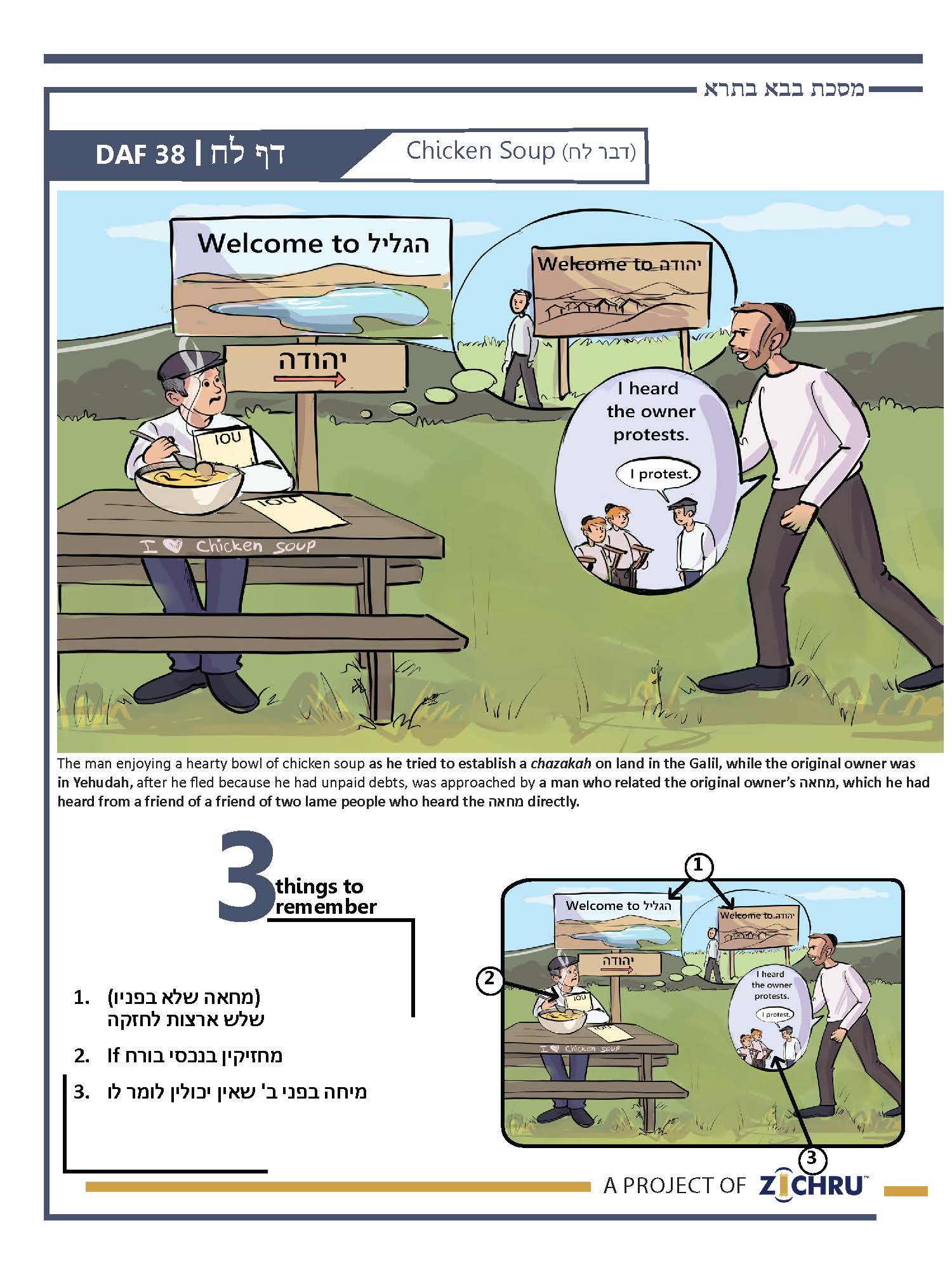Bava Basra - Daf 38
- Audio Timestamps
0:00 - The 3 Sugyos
2:59 - Review of 3 Sugyos
5:51- Siman
8:56 - 4 Blatt Back Chazarah
16:09 - Pop Quiz (Last 7 blatt)
For access to all Zichru resources including PDFs, and illustrations CLICK HERE
- שלש ארצות לחזקה (מחאה שלא בפניו)
The next Mishnah states: שלש ארצות לחזקה – there are three lands in Eretz Yisroel regarding chazakah: יהודה, עבר הירדן, and גליל. If the former owner was in Yehudah and the occupant in Galil, or the reverse, it is not a valid chazakah עד שיהא עמו במדינה אחת – until [the original owner] is with him in the same province. Rebbe Yehudah disagrees and says that the entire reason chazakah requires three years is so that if the former owner was as far as Spain, and someone occupies his field for one year, people can go notify him during the second year, and he can come protest in the third year. He holds a chazakah can be established immediately if the owner is local, but three years were instituted for an owner who is abroad. The Gemara wonders about the Tanna Kamma’s opinion on מחאה שלא בפניו – a protest lodged not in the owner’s presence. If it is a valid מחאה, a chazakah should be established even if the parties are in different provinces, and if it is not a valid מחאה, a chazakah should not be established even if they are in different cities in a single province!? It concludes that he holds מחאה שלא בפניו הויא מחאה, and the Mishnah’s ruling is for a שעת חירום – time of conflict, where travel between the two provinces was limited.
- If מחזיקין בנכסי בורח
Rav said: אין מחזיקין בנכסי בורח – one cannot establish a chazakah of a fugitive’s property. He holds like Rebbe Yehudah, that chazakah is based on the owner returning and protesting (but this בורח cannot return), and he holds מחאה שלא בפניו is not a valid מחאה. When this ruling was told to Shmuel, he asked: וכי למחות בפניו הוא צריך – Does he have to protest in [the owner’s] presence? Although Rav had explained the Tanna Kamma to hold מחאה שלא בפניו הויא מחאה, Rav himself holds like Rebbe Yehudah.
In a second version, Rav ruled מחזיקין בנכסי בורח – one can establish a chazakah in a fugitive’s property. Later, Rava rules, as the Gemara explains, that one can establish a chazakah against a בורח מחמת ממון – one fleeing for monetary reasons (i.e., unpaid debts), because he can protest from his distant location. However, one cannot establish a chazakah against a בורח מחמת מרדין – one fleeing because of murder. Since he is afraid for his location to become known (because his victim’s relatives may pursue him to take revenge), he cannot protest from his location.
- מיחה בפני ב' שאין יכולין לומר לו
In the second version above, Rav ruled one can establish a chazakah against a בורח, because he holds מחאה שלא בפניו is a valid מחאה. The Gemara asks that Rav already explained our Tanna Kamma to hold מחאה שלא בפניו הויא מחאה, and presumably holds like him!? It explains that Rav is teaching an additional novelty: דאפילו מיחה בפני ב' שאין יכולין לומר לו – that even if he protested in front of two people who cannot relate the protest to [the occupant] (e.g., they are lame), it is still a valid מחאה. Rav Anan reported that Shmuel told him that a מחאה made in front of people who cannot relate the מחאה to the occupant is not a valid מחאה. The Gemara’s explains Rav’s reasoning: חברך חברא אית ליה – your friend has a friend, וחברא דחברך חברא אית ליה – and your friend’s friend has a friend. Although the two witnesses themselves cannot relate the מחאה personally to the occupant, word will spread through others until it reaches him.
Siman – Chicken Soup (דבר לח)
The man enjoying a hearty bowl of chicken soup as he tried to establish a chazakah on land in the Galil, while the original owner was in Yehudah, after he fled because he had unpaid debts, was approached by a man who related the original owner’s מחאה, which he had heard from a friend of a friend of two lame people who heard the מחאה directly.


